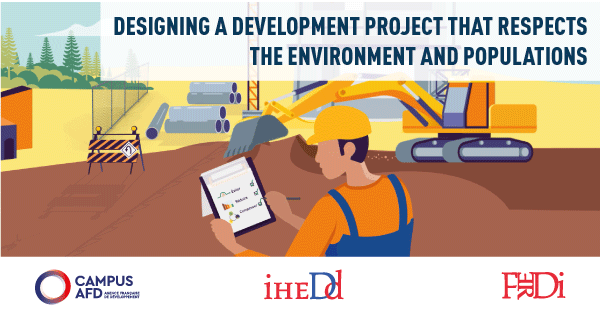Designing a development project that respects the environment and populations

Designing a development project that respects the environment and populations
Approximatively 5h
Certificate of completion
622 subscribers
This training focuses on the integration of environmental and social issues during the design of a development project. It deals successively with the following questions and provides some answers to them:
In what way can an environmental and social assessment effectively contribute to improving the quality of a development project?
What are the different types of measures to mitigate the negative E&S impacts that need to be defined during the design of a project and how to implement in practice the “ARC sequence” (Avoid – Reduce – Compensate)?
What are the practical arrangements for conducting an E&S assessment? In particular, what is the “right timing”? What resources need to be mobilized in terms of expertise or assessment tools? Who are the different stakeholders involved in the E&S assessment process?
After this training, you will know how to present several good reasons, and therefore how to convince your counterparts, for conducting an environmental and social assessment of a development project in order to take the E&S issues into account at the earliest possible stage of its design.
You will know the objectives and purpose of an E&S assessment of a project and you will know how to give a brief presentation of the various E&S assessment tools that can be used, as well as the content of an E&S impact assessment (ESIA) and an E&S Management Plan (ESMP).
Finally, you will be familiar with the ARC sequence and the main principles for managing an E&S assessment (timetable, stages, resources to mobilize, stakeholders…).
| # |
Programme
|
|---|---|
| 1 | Module 1 : Why conduct an E&S assessment? |
| 2 | Module 2 : How to manage the negative E&S impacts of a project? |
| 3 | Module 3 : In practice, when, how and with whom to conduct an E&S assessment?
|
| 4 | Module 4 : Conclusion |
| 5 |
Module 5 : Self-evaluation |
Each digital module includes exercises and quizzes to check your skills and put you into practice.
Additional documents to go further are made available to learners who would like to dig deeper into the topics covered.
-
- FERDI - IHEDD : FERDI is a think tank which was created in 2003. Its primary, research-based purpose, is to influence the international discussion on major development issues.
Independent and not-for-profit, FERDI mobilizes high-level researchers in the field of international development and offers relevant and innovative thinking on the key issues in development economics.
FERDI is particularly active on issues related to development effectiveness, sustainable development, and global governance.
We wish you a nice course !
